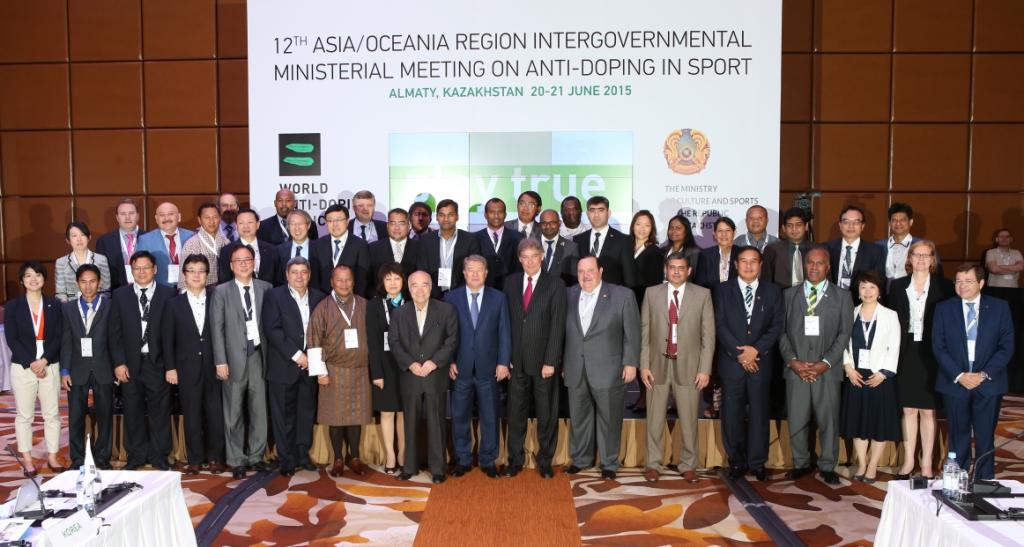ASTANA – The 12th annual Asia/Oceania Region Intergovernmental Ministerial Meeting on Anti-Doping in Sport, organised by the World Anti-Doping Agency (WADA), was held June 20-21 in Almaty.
According to Kazakhstan’s National Anti-Doping Centre, 60 participants from 26 countries attended to present their progress reports, share experiences and discuss alternative ways of effective anti-doping. The exchanges created a productive base for cooperation and partnership between the Asia and Oceania anti-doping organisations.
WADA was established in 1999 as an international independent agency composed and funded equally by the sports movement and governments of the world. Its key activities include scientific research, education, developing anti-doping capacities and monitoring the World Anti-Doping Code – the document coordinating anti-doping policies in all sports and countries.
Almaty is the host of WADA’s Regional Anti-Doping Organisation, which is responsible for coordinating anti-doping activity across eight countries in Central and South Asia.
Opening the conference, WADA Director General David Howman said the agency seeks to maintain a unique partnership between the sports movement and governments, with its main aim being “to protect the clean athlete and provide a level playing field for all.”
Commenting on Kazakhstan’s efforts in this direction, he said “rapid development of the sports infrastructure in Kazakhstan has allowed the country to become a leader in the fight against doping in sport within the Central Asia region.”
“Today’s meeting is a unique platform helping to foster the combination and complementing of sports’ and governments’ respective resources and assets and results in a coordinated and cohesive approach to anti-doping,” Howman added.
Kazakhstan signed the Anti-Doping Rules in 2004 and ratified the International Convention against Doping in Sports in December 2009. The country furthered its commitment by joining the intergovernmental cooperation in the fight against doping.
Addressing the conference delegates, Kazakh Vice-Minister of Culture and Sport Saken Mussaibekov said he believed “the problem of doping at the moment is one of the central problems of modern sports, as doping is not only detrimental to an athlete’s health, but also undermines the foundations and the image of the sport.”
In this respect, the official said the Anti-Doping Rules of the Republic of Kazakhstan, adopted in 2014 fully comply with the World Anti-Doping Code.
The National Anti-Doping Centre was established in 2012 to coordinate and control the anti-doping activities in the country and ensure the full functioning of the Anti-Doping Laboratory created in 2002 in Almaty in accordance with the requirements of the convention. According to Mussaibekov, “the centre works in line with all WADA standards as a key element in the implementation of the national anti-doping policy.”
Kazakh Minister of Foreign Affairs Erlan Idrissov also addressed the conference. As he met the delegates, Idrissov commended the noble goals of anti-doping activities.
“Sport teaches us essential values such as respect for the rules and the reward for dedication and teamwork, as well as giving a huge amount of enjoyment. But, of course, sport can only have this positive impact if we are confident that those taking part are competing on a level playing field. If athletes have an unfair advantage through performance-enhancing drugs or treatments, it sets the wrong example,” he emphasised.
Idrissov also highlighted the fact the conference was taking place in Almaty as the city is competing for the right to host the Winter Olympic Games in 2022.
“It is a bid which has excited the entire country and has the full backing of the government. We may have been underdogs when the process started, but the beauty of sports is that the favourites don’t always win – and it is clear we have been catching up fast,” he said in this regard.
The minister said his hope was to “welcome all of you again to Almaty to enjoy what I am sure will be a wonderful event in a city and country steeped in the tradition of winter sports.” He added that “thanks in part to the efforts of this conference, we will marvel at the competition confident in the knowledge that the performances we witness are true and clean.”
The Central Asian region has never hosted the Olympic Games. When the bidding process began two years ago, Almaty was seen very much as the outsider among cities wanting to hold the event. The Almaty 2022 bid gained momentum, however, after an encouraging evaluation report June 1 from the International Olympic Committee (IOC), which noted the relevance of the bid’s slogan, “Keeping it Real,” in all aspects of the Almaty plan and the successful technical presentation of the bid June 9 in Lausanne, Switzerland. The final decision will be made this summer at the 128th IOC session in Kuala Lumpur, Malaysia, where 99 voting members will cast their ballots in secret to choose between Almaty and Beijing.
Andrey Kryukov, WADA foundation board member and vice chairman of the Almaty 2022 bid committee, concluded the event by noting the significance the country places on the subject of anti-doping.
“Today’s anti-doping discussions are of great importance to the entire sporting society of Kazakhstan. Almaty is the major sports centre in our country and our WADA-recognised Anti-Doping Laboratory is a huge asset in our bid to host the 2022 Olympic Winter Games. We believe that the measures taken to combat doping in sports will contribute to the promotion of sports and culture of healthy lifestyles in Kazakhstan.”
Since the country’s independence in 1991, Kazakh athletes have won 59 medals (17 gold, 20 silver, 22 bronze) in the Summer and Winter Olympic Games, 643 medals (207 gold, 192 silver and 244 bronze) during the Asian Games, 40 medals (eight gold, 12 silver, 20 bronze) at the Summer Paralympics and one silver medal at the Winter Paralympics. The country illustrated its sports’ prowess at the 2012 London Olympics, where its team placed 12th in the medal count.


